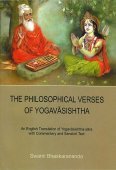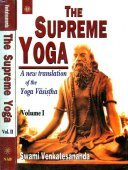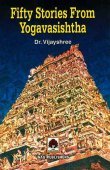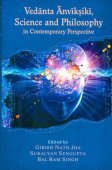Yoga-vasishtha, Yogavasishtha, Yoga-vāsiṣṭha, Yogavāsiṣṭha: 8 definitions
Introduction:
Yoga-vasishtha means something in Hinduism, Sanskrit. If you want to know the exact meaning, history, etymology or English translation of this term then check out the descriptions on this page. Add your comment or reference to a book if you want to contribute to this summary article.
The Sanskrit terms Yoga-vāsiṣṭha and Yogavāsiṣṭha can be transliterated into English as Yoga-vasistha or Yoga-vasishtha or Yogavasistha or Yogavasishtha, using the IAST transliteration scheme (?).
In Hinduism
General definition (in Hinduism)
Source: archive.org: A History of Indian PhilosophyThe Yoga-vāsiṣṭha is throughout a philosophical work, in the form of popular lectures, and the same idea is often repeated again and again in various kinds of expressions and poetical imagery. But the writer seems to have been endowed with extraordinary poetical gifts. Almost every verse is full of the finest poetical imagery; the choice of words is exceedingly pleasing to the ear, and they often produce the effect of interesting us more by their poetical value than by the extremely idealistic thought which they are intended to convey.
The author of the Yoga-vāsiṣṭha was probably a contemporary of Gaudapāda or Śaṅkara, about a.d. 800 or a century anterior to them.
The work contains six books, or prakaraṇas, namely,
- Vairāgya,
- Mumukṣu-vyavahāra,
- Utpatti,
- Sthiti,
- Upaśama
- and Nirvāṇa.
Several commentaries have been written on it. Of these commentaries I am particularly indebted to the Tātparya-prakāśa of Anandabodhendra. Thus Advayāraṇya, son of Narahari, wrote a commentary on it, called Vāsiṣṭha-Rāmāyaṇa-candrikā. Anandabodhendra Sarasvatī, pupil of Gaṅgādharendra Sarasvatī of the nineteenth century, wrote the Tātparya-prakāśa.
It is known also by the names of Ārṣa-Rāmāyaṇa, Jñāna-vāsiṣṭha, Mahā-Rāmāyaṇa, Vāsiṣṭha-Rāmāyaṇa or Vāsiṣṭha.
Source: WikiPedia: HinduismYoga-Vāsiṣṭha ( योग-वासिष्ठ) is a philosophical text attributed to Valmiki, but the real author is unknown. The complete text contains over 29,000 verses. The exact century of its completion is unknown, but has been estimated to be somewhere between 6th-century. The text is named after sage Vasistha who is mentioned and revered in the seventh book of the Rigveda, and who was called as the first sage of the Vedanta school of Hindu philosophy by Adi Shankara. The text is structured as a discourse of sage Vasistha to Prince Rama.
The text consists of six books. The first book presents Rama's frustration with the nature of life, human suffering and disdain for the world. The second describes, through the character of Rama, the desire for liberation and the nature of those who seek such liberation. The third and fourth books assert that liberation comes through a spiritual life, one that requires self-effort, and present cosmology and metaphysical theories of existence embedded in stories. These two books are known for emphasizing free will and human creative power. The fifth book discusses meditation and its powers in liberating the individual, while the last book describes the state of an enlightened and blissful Rama
Source: The Book of Dzyan: The Mokṣopāya, the unrevised Yoga-VāsiṣṭhaIn the Yoga-Vāsiṣṭha, a pervasive layer of Vedānta ideas has been added to the advaita or non-dual teachings of the Mokṣopāya. Perhaps the most significant difference between the two is the well-known fact that Advaita Vedānta takes the authority of scripture as the only truly valid means of higher knowledge, thereby discounting the role of reasoning in reaching higher knowledge. The Mokṣopāya does just the opposite, taking reasoning as the valid means of higher knowledge, and entirely discounting the authority of scripture.
Languages of India and abroad
Sanskrit dictionary
Source: DDSA: The practical Sanskrit-English dictionaryYogavāsiṣṭha (योगवासिष्ठ).—Name of a work (treating of the means of obtaining final beatitude by means of Yoga).
Derivable forms: yogavāsiṣṭham (योगवासिष्ठम्).
Yogavāsiṣṭha is a Sanskrit compound consisting of the terms yoga and vāsiṣṭha (वासिष्ठ).
Source: Cologne Digital Sanskrit Dictionaries: Aufrecht Catalogus Catalogorum1) Yogavāsiṣṭha (योगवासिष्ठ) as mentioned in Aufrecht’s Catalogus Catalogorum:—called also ārṣarāmāyaṇa or jñānavāsiṣṭha or mahārāmāyaṇa or vāsiṣṭharāmāyaṇa or vāsiṣṭha a sequel to the Rāmāyaṇa, is classed with the Vedānta, and attributed to Vālmīki. It is divided into 6 prakaraṇa, namely Vairāgya, Mumukṣuvyavahāra, Utpatti, Sthiti, Upaśama, Nirvāṇa. Io. 306-8. 1810. W. p. 187 (Utpattiprakaraṇa). Oxf. 353^b. Hall. p. 121. L. 2049. Khn. 56. K. 138 (and—[commentary]). B. 2, 56. 4, 84. Report. Xxviii. Ben. 34. 58. 60. 62. Bik. 565 (part of the Nirvāṇaprakaraṇa). Tu7b. 23. Kāṭm. 5. Rādh. 6 (and—[commentary]). 7 (and—[commentary]). Oudh. Xvii, 78. Burnell. 89^a. Bhr. 72. Poona. 450. 543. 557. 607. Ii, 24. 116. 117. 217-20. 224. 225. 232. H. 241 (Nirvāṇaprakaraṇa). Oppert. 3004. 3913. 5982. 7370. 7396. 7601. 8195. Ii, 482. 3450. 4605. 7561. 7955. 8734. 8775. 9582. Rice. 70. 144. 326 (Upaśamaprakaraṇa).
—[commentary] B. 4, 84. Oppert. 7371. Ii, 9781.
—[commentary] Yogavāsiṣṭhatātparyasaṃgraha. NW. 282.
—[commentary] Saṃsārataraṇi. L. 2865. B. 4, 84. Bhr. 72. See Yogavāsiṣṭhasaṃkṣepa.
—[commentary] by Advayāraṇya. L. 2205. Proceed. Asb. 1869, 137.
—[commentary] Candrikā by Ātmasukha. Khn. 56. B. 4, 84. Oudh. Xiii, 42. Poona. 543. 557. Bhr. 72.
—[commentary] Tātparyaprakāśa by Ānandabodhendra Sarasvatī, pupil of Gaṅgādharendra Sarasvatī. Io. 306-8. Hall. p. 121. L. 2049. B. 4, 84. Tu7b. 23. Burnell. 89^a.
—[commentary] by Gaṅgādharendra Sarasvatī. Io. 1810.
—[commentary] Padacandrikā by Mādhava Sarasvatī. Ben. 58.
—[commentary] by Rāmadeva. Burnell. 89^b. Oppert. Ii, 985.
—[commentary] Yogavāsiṣṭhatātparyaprakāśa by Sadānanda. NW. 304. Bṛhadyogavāsiṣṭha. Poona. 419. Laghujñānavāsiṣṭha. Oppert. 6838. 6990. 7073. Yogavāsiṣṭhaślokāḥ. Poona. 445 (and—[commentary]).
2) Yogavāsiṣṭha (योगवासिष्ठ):—divided into 6 prakaraṇa. Gov. Or. Libr. Madras 29. 73 (and—[commentary]). 84. Hz. 339 (Bhūmikādīpikā ?). 612. (Vairāgya and Mumukṣu). Io. 302-309. 2156 (2). 2174 (4). 2205 (5). 2352 (1). 2442 (3). 2766 (6^b). 2941 (2. 5. 6). 3168 (6^a). 2442 (Khilā Mokṣopāyāḥ). Oudh. Xxi, 148 ([fragmentary]). Stein 124 (Nirvāṇa inc). *) The second part of the Nirvāṇaprakaraṇa is loosely connected with the first part, and has been added by a later writer. Yogavāsiṣṭhe Vasiṣṭhabhuśuṇḍasaṃvāda (Nirvāṇaprakaraṇa ch. 14 fg.). Rgb. 125.
—[commentary] Tātparyaprakāśa by Ānandabodhendra Sarasvatī. Io. 302-309. 2941 (2. 5. 6). Stein 124.
Yogavāsiṣṭha has the following synonyms: Jñānavāsiṣṭha, Vāsiṣṭharāmāyaṇa, .
3) Yogavāsiṣṭha (योगवासिष्ठ):—Ulwar 548. 549.
—[commentary] by Ānandabodhendra Sarasvatī. Ulwar 549.
4) Yogavāsiṣṭha (योगवासिष्ठ):—As p. 156 (all 6 Prakaraṇa). Bc 275. Bd. 663. Cs 3, 97 (parts of the Utpatti and Sthiti). 3, 98 (the Uttarārdha of the Nirvāṇa). 3, 99 (the same). 3, 100 (the latter part of the Mumukṣuvyavahāra). 3, 101 (the latter part of the Vairāgya). 3, 102 (parts of Nirvāṇa). Śg. 2, 149 ([fragmentary] and C.). C. by Advayāraṇya. As p. 156. C. Tātparyaprakāśa by Ānandabodhendra. As p. 156. Bd. 663. Cs 3, 98-102 (as above).
Source: Cologne Digital Sanskrit Dictionaries: Monier-Williams Sanskrit-English DictionaryYogavāsiṣṭha (योगवासिष्ठ):—[=yoga-vāsiṣṭha] [from yoga] n. Name of [work] (also called Vāsiṣṭha-rāmāyaṇa, in the form of a dialogue between Vāsiṣṭha and his pupil Rāma, treating of the way of obtaining happiness cf. [Indian Wisdom, by Sir M. Monier-Williams 368])
[Sanskrit to German]
Sanskrit, also spelled संस्कृतम् (saṃskṛtam), is an ancient language of India commonly seen as the grandmother of the Indo-European language family (even English!). Closely allied with Prakrit and Pali, Sanskrit is more exhaustive in both grammar and terms and has the most extensive collection of literature in the world, greatly surpassing its sister-languages Greek and Latin.
See also (Relevant definitions)
Partial matches: Vasishtha, Yoga.
Ends with: Samkshepayogavasishtha.
Full-text (+95): Vasishtharamayana, Yogavasishthiya, Arsheyaramayana, Yogavasishthasamkshepa, Yogavasishthatatparyaprakasha, Yogavasishthasaravivriti, Yogavasishthasara, Yogavasishthashastra, Yogavasishthasaracandrika, Yogavasishthasarasamgraha, Yogavasishthatika, Aryaramayana, Samkshepayogavasishtha, Mokshopaya, Nanavacittam, Maharamayana, Yogavartika, Brihadvasishtha, Vasishthasara, Laghujnanavasishtha.
Relevant text
Search found 16 books and stories containing Yoga-vasishtha, Yogavasistha, Yogavasishtha, Yoga-vāsiṣṭha, Yogavāsiṣṭha, Yoga-vasistha; (plurals include: vasishthas, Yogavasisthas, Yogavasishthas, vāsiṣṭhas, Yogavāsiṣṭhas, vasisthas). You can also click to the full overview containing English textual excerpts. Below are direct links for the most relevant articles:
A History of Indian Philosophy Volume 2 (by Surendranath Dasgupta)
Part 1 - Introduction of the Yogavāsiṣṭha Theme < [Chapter XII - The Philosophy of the Yogavāsiṣṭha]
Part 12 - Yoga-vāsiṣṭha, Śaṅkara Vedānta and Buddhist Vijñānavāda < [Chapter XII - The Philosophy of the Yogavāsiṣṭha]
Part 10 - Stages of Progress < [Chapter XII - The Philosophy of the Yogavāsiṣṭha]
Jainism and Patanjali Yoga (Comparative Study) (by Deepak bagadia)
Part 3 - Various Scriptures of Yoga < [Chapter 2 - Yoga philosophy and practices]
Part 7 - Yoga in various Jain and Indian literatures < [Chapter 1 - Introduction]
Preceptors of Advaita (by T. M. P. Mahadevan)
(i) Jñānadeva < [56. Some Authors of Works in Regional Languages]
Laghu-yoga-vasistha (by K. Narayanasvami Aiyar)
Yoga Vasistha [English], Volume 1-4 (by Vihari-Lala Mitra)
Yoga-sutras (Ancient and Modern Interpretations) (by Makarand Gopal Newalkar)
Sūtra 2.6 [Asmitā—egoism] < [Book II - Sādhana-pāda]
Sūtra 3.6 < [Book III - Vibhūti-pāda]
Sūtra 4.8 < [Book IV - Kaivalya-pāda]
Related products
(+1 more products available)





